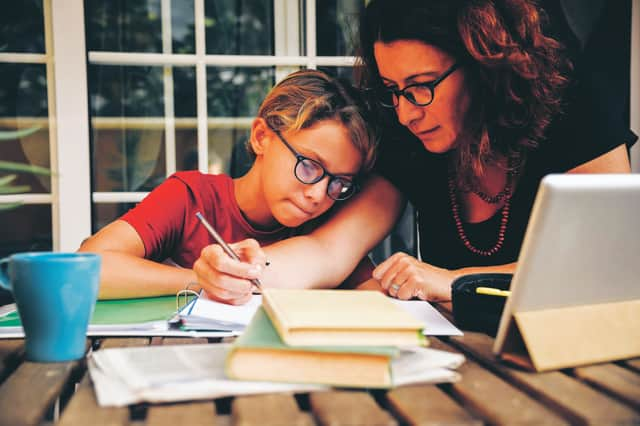Part-time schooling will leave working parents in the lurch, warn experts


And the prospect of effective social distancing in schools, particularly among older pupils, may be “impossible” to implement, Scotland on Sunday has been told.
The provision of online support tutors should now be considered as a way to help parents struggling to play the role of makeshift teachers for their children, as well as seeking to balance the demands of work.
Advertisement
Hide AdAdvertisement
Hide AdNicola Sturgeon unveiled plans last week for a system of “blended teaching” to be implemented in Scotland when schools go back on 11 August as part of the route map out of lockdown. It is likely to mean that youngsters are in classrooms for one week at a time, while spending alternate weeks at home.
This is because schools cannot operate at full capacity without breaching social distancing guidelines. It will also provide time for them to be deep-cleaned.
The First Minister has suggested that employers must adopt a more open approach to flexible working, including the prospect of four-day weeks becoming the norm, as families attempt to adapt to the overhaul.
Lindsay Paterson, Professor of Education policy at Edinburgh University said some form of blended learning is the only way to restore “any kind schooling” in Scotland while coronavirus remains in the community.
“Pupils are already used to technology in education, because many local authorities have been supplying tablets or laptops to all pupils,” he said.
But he added: “The main point is the difficulty of reconciling part-time schooling with parents’ work. Having children in school only part-time will cause a crisis for many families’ working patterns, since one parent would have to be at home to look after the children who are not in school.
“If families have children of different ages whose patterns of part-time schooling differ, then the whole working week might need a parent to be at home. Unless the need to balance parents’ work commitments with children’s part-time schooling is resolved, the blended approach can’t even start.”
Keir Bloomer, chair of the Reform Scotland’s Commission on School Reform and an architect of the current Curriculum for Excellence also said these logistical issues could be a stumbling block.
Advertisement
Hide AdAdvertisement
Hide Ad“Blended learning – it looks like about 50 per cent home learning – is not going to work terribly well for those parents who are out working who, of course, will include the teachers,” he said.
The implementation of effective social distancing in schools when they return in August is central to the Scottish Government’s plans.
“School children are not necessarily very compliant,” Bloomer continued. “Very young ones are forgetful and may break social distancing by mistake.
“The disciplinary problems you will encounter, for example, in secondary school trying to enforce social distancing will be completely unmanageable.
“So it just won’t happen.”
And when pupils are not in school, the challenge for parents will be to ensure they remain “on task” from the start of an academic year, unlike the current lockdown which kicked in towards the end of term.
Prof Paterson added: “That has been probably the largest difficulty during the shutdown.
“Few parents will have the knowledge of the curriculum or of child development that would enable them to oversee their children’s work as effectively as a teacher can do.
“Even if a parent is working from home, giving adequate attention to work and to child supervision is impossible.”
Advertisement
Hide AdAdvertisement
Hide AdHe is now calling for national education bodies like Education Scotland and the Scottish Qualifications Authority, as well as councils to do more to support parents than has been the case so far.
Prof Paterson added: “Parents who can afford tutors are already paying for them. The public provision of family support tutors is one way in which parents could be supported in the work that blended learning would require.”
But the crisis may have provided the education system with valuable experience of working in very different way, according to Bloomer.
“We ought to learn lessons from that,” he said.
“And one of the lessons is that the traditional way in which schools use their human resources has serious limitations.
“We use almost all of it to put a teacher in front of a class all day.
“That means support for the individual, support for small groups experiencing difficulty, don’t get very much priority.
“Blended learning does that better. So if we had a strategy for how this blended learning was to take place then there could be some pretty valuable spin-offs from it.”
But there is “no sign of such a strategy” at the moment.
“That’s the bit I think has promise and if serious attention were given to how this blended learning was to be carried out in August then there could be significant benefits.”
Comments
Want to join the conversation? Please or to comment on this article.